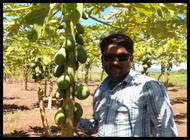February 2017
Md. Mujibul Munir learns about papaya planting at a papaya farm at Sabeto, Nadi, Fiji Islands.
Program Manager of the MTCP 2 Project in Bangladesh and Assistant Director for the Food Security, Education and Development Communication of Coastal Association for Social Transformation Trust (COAST) Trust , Muhammad Mujibul Munir left Fiji’s shores with valuable lessons after a 6 day Learning Exchange with PIFON this past week. COAST is the National Implementing Agency for the MTCP II project in Bangladesh.
Bangladesh and Pacific are recipients of AFA Awards at the Regional Steering Committee meeting that was held in Lao’s in April 2016, so it was opportune that these two met on this Learning Exchange in Fiji.
Muhammed visited PIFON to observe development activities for farmers’ groups, especially the farmers’ cooperatives in Fiji. Part of his visit from 28 January 2016, included field trips to PIFON member FOs, Nature’s Way Cooperative, the South Sea Orchids Ltd and Bula Agro Enterprises to observe its daily operations and farm visits.
According to Mr. Munir, agriculture contributes about 16% of the total GDP of Bangladesh. It once contributed about 30% during the 80’s. About 45% of the total labour force in Bangladesh are engaged in agriculture, yet farmers continue to face many problems.
Muhammed states the following as his takeaway lessons from the exchange to share with COAST:
- Agriculture should be business oriented. A business that can benefit the farmers, as well as the country
- Alternative crops should be sought without too much dependence on the normal and usual crops, if it fails to ensure profit to the farmers. There should be continuous action research on alternative farming, alternative crops, alternative agriculture.
- Value Chain training is a must for all the actors in a chain in order to teach the stakeholders what each actor in the value chain contributes and their relative share. This would address the misinformation that many of farmers have of middlemen and retailers.
- Farmers should not always depend on the government services, rather they should help each other using methods such as that promoted by PIFON i.e. farmer to farmer learning exchanges.
- Member-based farmers’ organizations should be technical and business oriented for sustainability.
Mr. Munir acknowledges the Asian Farmers Association for Sustainable Rural Development (AFA) for facilitating the learning visit with special thanks to PIFON for hosting. He believes that learning exchanges between FOs as such will foster better cooperation and collaboration that will be of great benefit to farmers.
Dhanyavad, safe travels and best of luck for the year Mr. Munir and COAST.

